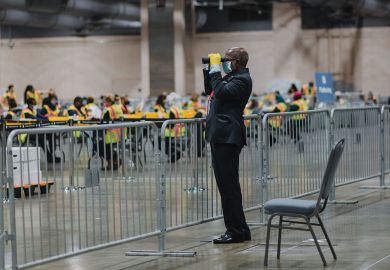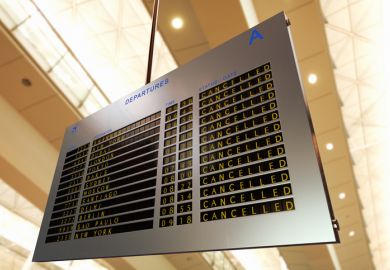The number of international students applying to US universities for the coming academic year has jumped by 11 per cent, according to initial estimates, raising hopes of a quick rebound under the Biden administration.
The data from Common App, a non-profit provider of college admissions services, bolster a growing sense in academia that President Biden will bring substantial positive change in US treatment of people born abroad.
The preliminary report from the Common App, which serves some 900 institutions, “makes us cautiously optimistic that foreign students are more hopeful about studying in the US”, said Sarah Spreitzer, director of government relations at the American Council on Education.
US colleges got a big related boost over the weekend as Biden administration officials made clear they plan an immediate and comprehensive push on immigration policy.
“We are extremely heartened” by the approach the new administration has been explaining, said Miriam Feldblum, executive director of the Presidents’ Alliance on Higher Education and Immigration, a grouping of US college leaders.
The Biden plan, while focused on needs far wider than those of higher education, would if successful in Congress resolve the status of more than 450,000 college students in the country without legal status. It also would exempt doctoral graduates in the sciences from visa limits.
The growth in international applicants as tallied by the Common App came despite a 13 per cent drop from China, the single largest source of foreign students at US universities.
Countries producing major single-year increases in foreign applications to US institutions for the coming autumn, in order of their existing shares, included India (33 per cent), Canada (20 per cent), Brazil (53 per cent), the UK (20 per cent) and Pakistan (51 per cent).
The size of such jumps, several experts said, likely reflected factors that included progress against the coronavirus and pent-up demand for US higher education that accumulated during the Trump administration, when overseas enrolments sagged.
“Despite the Trump administration’s anti-immigrant rhetoric, international students understand the value of a US education,” said Stephen Yale-Loehr, professor of immigration law practice at Cornell University.
Actual gains in autumn enrolment might prove more modest than the initial Common App data suggested, said Gerardo Blanco, associate professor of higher education at Boston College. Nevertheless, Dr Blanco said, the Common App numbers “were an early sign that international mobility will have a strong recovery”.
Important questions to be answered before the autumn, experts said, included the success of the battle against the coronavirus and the direction of social unrest reflected in the mob attack on the US Capitol.
China has long been the leading supplier of international students in the US, and antagonisms between the US and Chinese governments have been especially pronounced during the Trump administration.
But the tensions are expected to persist in some form into the Biden administration. The decline in Chinese student enrolment seen in the Common App data therefore should provide US college leaders with another strong warning about growing overly dependent on them, said Lindsay Addington, director of global engagement at the National Association for College Admission Counseling.
“Institutions that have been focused on market diversification will be in better positions to stabilise international enrolment – to the extent possible in a global pandemic,” Dr Addington said.
The numbers from China may yet improve, said Christopher Rim, chief executive of Command Education, a college admissions counselling service. Mr Rim said his company, since Mr Biden’s electoral victory, had “seen a noticeable increase in inbound enquiries from students and families in Shanghai, Shenzhen and Hong Kong”.
The Common App data also suggest the US has been paying insufficient attention to growing its own universities by meeting the needs of its struggling domestic students. The findings include a 12 per cent increase in applications to more selective US universities but a 7 per cent drop in college applications among first-generation and low-income applicants.
Many low-income and first-generation students have been deterred by the technical and logistical complications of studying remotely and may face pressure during the economic decline to skip college and find work, Mr Rim said.
Job prospects are also a critical question for foreign students and the ability of US colleges to keep attracting them. Experts have been warning that countries that compete with the US for foreign students have been improving their policies in that area, while the Trump administration retreated.
In seeking a comprehensive solution across a full range of immigration and visa policies, the Biden administration has set a tough goal but one well worth aiming for, Dr Feldblum said. She said that three decades of experience in the field have shown piecemeal approaches consistently ending in failure.
“Let’s try this one,” she said of the more comprehensive Biden approach, “especially given the context of both the pandemic and the past four years.”
POSTSCRIPT:
Print headline: ‘Biden bump’ ups overseas applications for US study
Register to continue
Why register?
- Registration is free and only takes a moment
- Once registered, you can read 3 articles a month
- Sign up for our newsletter
Subscribe
Or subscribe for unlimited access to:
- Unlimited access to news, views, insights & reviews
- Digital editions
- Digital access to THE’s university and college rankings analysis
Already registered or a current subscriber?








